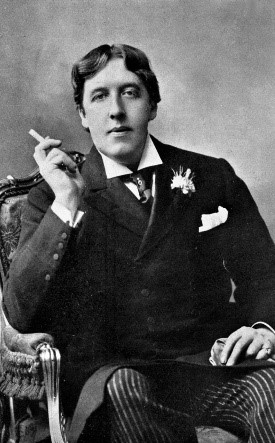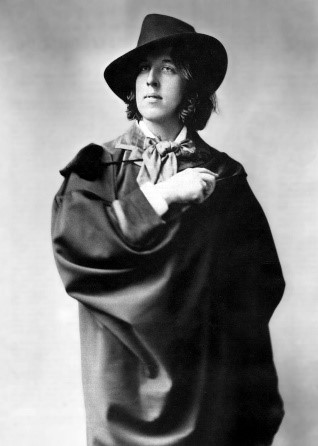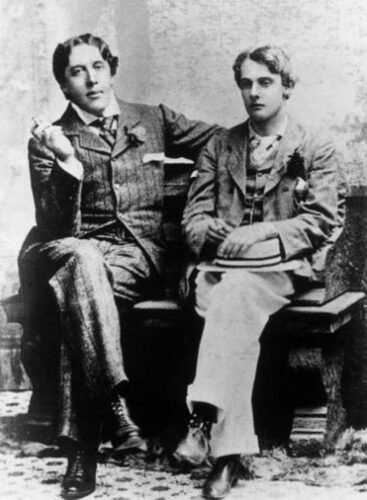Oscar Wilder: Iconic Gay Writer
 Oscar Wilde -whose full name was Oscar Fingal O’Flahertie Willis Wilde- became one of the most popular and fashionable playwrights of the early 1890’s in Victorian London. He is also one of the most celebrated and iconic gay men of British history. Mr Wilde was originally from Ireland Dublin, born on 16th October 1854 at Westland Row, and as such he was an Irish born Poet and Dramatist. However, Wilde was also ultimately a tragic figure as he went from being an artistic Playwright and flamboyant wit, to being a man struck down by tragedy who was imprisoned for two years and ultimately dying penniless in a cheap hotel in Paris.
Oscar Wilde -whose full name was Oscar Fingal O’Flahertie Willis Wilde- became one of the most popular and fashionable playwrights of the early 1890’s in Victorian London. He is also one of the most celebrated and iconic gay men of British history. Mr Wilde was originally from Ireland Dublin, born on 16th October 1854 at Westland Row, and as such he was an Irish born Poet and Dramatist. However, Wilde was also ultimately a tragic figure as he went from being an artistic Playwright and flamboyant wit, to being a man struck down by tragedy who was imprisoned for two years and ultimately dying penniless in a cheap hotel in Paris.
Wilde’s parents were both professional, intelligent and highly accomplished individuals. Wilde’s mother (Lady Jane Wilde, 1820-1869) wrote patriotic Irish verse. She was a successful poet and journalist, and also wrote revolutionary poetry under the pseudonym Speranza. She was also considered an authority on Celtic Myth and Folklore. Lastly Wilde’s mother is credited with having inspired her son’s love of poetry and neo-classical art. Wilde’s father (Sir William Wilde, 1815-1876) was also a gifted literary figure, and produced books on ‘Archaeology and Folklore’. Besides, he was also a medical professional, in fact described as ‘Ireland’s leading ear and eye surgeon’.
Oscar Wilde can be more accurately described as Anglo-Irish who was a Playwright, a Novelist, Poet, Lecturer, Journalist and Critic. However, he only wrote one novel in his career, which was ‘The Picture of Dorian Grey’. Wilde was also part of what could be described as an ideology or a philosophy known as the Aesthetic movement that was popular in England during the Victorian era. Its ‘creed’ has been summarised as ‘Art for Art’s sake’
 Having come from such an accomplished cultural family, it would seem inevitable that Wilde would receive a good education. He first went to Portora Royal School (between 1864-71) then attended Trinity College Dublin (1871-74) and finally Magdalen College Oxford (1874-78). It was during his time at Magdalen College that Wilde became a strong admirer of the teachings and philosophy of the English writers John Ruskin and Walter Pater, who taught about the ‘central importance of art in life’. Pater stressed that life should be lived with aesthetic intensity. Wilde thus became known during his Oxford days for his involvement with the Aesthetic and decadent movements. Wilde began to wear his hair long and decorated his rooms with ‘Peacock feathers, lilies, sunflowers, blue china and other objets d’art’. The ‘aesthetics’ had ‘languishing attitudes’ and a showy flamboyant dress sense.
Having come from such an accomplished cultural family, it would seem inevitable that Wilde would receive a good education. He first went to Portora Royal School (between 1864-71) then attended Trinity College Dublin (1871-74) and finally Magdalen College Oxford (1874-78). It was during his time at Magdalen College that Wilde became a strong admirer of the teachings and philosophy of the English writers John Ruskin and Walter Pater, who taught about the ‘central importance of art in life’. Pater stressed that life should be lived with aesthetic intensity. Wilde thus became known during his Oxford days for his involvement with the Aesthetic and decadent movements. Wilde began to wear his hair long and decorated his rooms with ‘Peacock feathers, lilies, sunflowers, blue china and other objets d’art’. The ‘aesthetics’ had ‘languishing attitudes’ and a showy flamboyant dress sense.
Wilde’s intellectual talents also included being an exceptional linguist. He studied Greek for nearly nine years and became fluent in English, German, French and he had a working knowledge of Italian and Greek. Unfortunately he apparently was unable to speak a single word of Irish.
When his studies at Oxford came to completion, Wilde returned to Ireland for romantic purposes as he wanted to meet a potential love interest, the renowned beauty Florence Balcombe. Unfortunately for Wilde, this potential romance was never to be as Miss Balcombe had become engaged to Bram Stoker, the famous author of ‘Dracula’. Heartbroken, Wilde moved to London and boarded with portrait artist Frank Miles who was highly successful. Wilde lived on the highly fashionable Tite Street in Chelsea, a residence that also boasted none other than the painter James Whistler and illustrator Charles Rickets with his partner Charles Shannon.
Apart from his literary accomplishments, Wilde was also renowned for his ‘dazzling’ wit and has also often been described as ‘flamboyant’- a description that can also be extended to his affairs with men. After moving back to England, Wilde soon became a name in Victorian London’s ‘society circles’, who drew into his orbit a number of admirers ‘flocking’ to Chelsea to spend time with him and Miles. This was partly in response to the fact that Wilde had published, at his own expense, a Poetry collection (his first in 1881) despite the fact that he had been lampooned by Punch magazine.
The followers that Wilde attracted into his orbit have been described as having ‘initiated a personal cult, self-consciously effete and artificial’. In fact, Wilde wrote in 1894 ‘the first duty in life is to be as artificial as possible’. It would seem that with his decadence, he was deliberately setting out to contradict Victorian piety.
 Wilde spent an entire year lecturing in America. In 1882 when he travelled to the United States, having arrived at customs in New York City, he made perhaps his most famous quip that he had ‘Nothing to declare but his genius’. After his time in America, he returned to England where he also lectured. Wilde also tried his hand at editing and from the years 1887 to 1889, he edited the magazine ‘Woman’s World’. In 1888, Wilde wrote ‘The Happy Prince and Other Tales’, this being his first success as a prose writer. In 1892, he brought out another collection of Fairy Tales entitled ‘The House of Pomegranates’.
Wilde spent an entire year lecturing in America. In 1882 when he travelled to the United States, having arrived at customs in New York City, he made perhaps his most famous quip that he had ‘Nothing to declare but his genius’. After his time in America, he returned to England where he also lectured. Wilde also tried his hand at editing and from the years 1887 to 1889, he edited the magazine ‘Woman’s World’. In 1888, Wilde wrote ‘The Happy Prince and Other Tales’, this being his first success as a prose writer. In 1892, he brought out another collection of Fairy Tales entitled ‘The House of Pomegranates’.
Oscar Wilde, apart from being famous as a dramatist, playwright, wit and poet, is also famous as being an iconic gay man. Homosexuality was considered a crime during the Victorian era. As he famously had a homosexual relationship or ‘affair’ with the son of an aristocrat, his personal life became public knowledge, and he was ultimately tried, sentenced and imprisoned.
Wilde apparently became active as a gay man in 1886. He believed he was deliberately subverting the Victorian moral code and challenging society by creating scandal, albeit a personal private scandal. Furthermore, he believed that his subversion of the Victorian moral code was the inspirational ‘impulse’ to his literary career. Ultimately a rebel, Wilde ‘believed in the criminal mentality’ and perceived himself as a criminal. It is interesting to note here that the subject of criminality was woven into his only novel published in 1891‘The Picture of Dorian Gray’. In this story, the painter Basil Hallward is murdered, initiating Dorian’s disintegration as a pivotal moment. Initially the character Dorian did not age which is considered to be a metaphorical celebration of youth.

Wilde, who famously had a gay relationship with Lord Alfred Douglas, otherwise known as ‘Bosie’, was accused by his father, who happened to be the Marquis of Queensberry, of homosexuality. This resulted in Wilde suing Bosie’s father for libel. Tragically Wilde’s case went against him and he was ultimately arrested and tried for ‘gross indecency’. He was sentenced for two years hard labour – his crime being for ‘sodomy’.
As I don’t like to end my articles on such a bleak and negative note, I wanted to end by briefly mentioning some of Wilde’s work as a Playwright. It was between the years 1892-1895 that Wilde produced a number of Plays. These works proved to be popular with audiences as they relied on ‘puns and elaborate word games. In 1892, Wilde produced ‘Lady Windemere’s Fan’, in 1893 ‘A Woman of No Importance’, and in 1895 there was ‘An ideal Husband’ and ‘The Importance of Being Earnest’.

